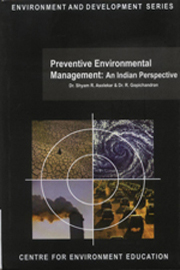Book contents
- Frontmatter
- Foreword
- Acknowledgements
- Contents
- List of Figures
- Summary
- Preface
- The Contents
- Preventive Environmental Management Tools
- Preventive Environmental Management Initiatives
- 9 Identification of Potential Interventions
- 10 Greener Chemistry and Cleaner Technologies
- 11 Greener Choices in Process Industry
- 12 Redesigning of Unit Operations and Unit Processes
- 13 Recycle and Reuse of Wastewater
- 14 Sustainable and Intelligent Consumption
- 15 Extended Producer Responsibility
- 16 Eco-industrial Networks
- Overarching Issues
- References
- Bibliography
- Web-Resources
- About the Authors
- Abbreviations
- Index
13 - Recycle and Reuse of Wastewater
from Preventive Environmental Management Initiatives
Published online by Cambridge University Press: 05 November 2011
- Frontmatter
- Foreword
- Acknowledgements
- Contents
- List of Figures
- Summary
- Preface
- The Contents
- Preventive Environmental Management Tools
- Preventive Environmental Management Initiatives
- 9 Identification of Potential Interventions
- 10 Greener Chemistry and Cleaner Technologies
- 11 Greener Choices in Process Industry
- 12 Redesigning of Unit Operations and Unit Processes
- 13 Recycle and Reuse of Wastewater
- 14 Sustainable and Intelligent Consumption
- 15 Extended Producer Responsibility
- 16 Eco-industrial Networks
- Overarching Issues
- References
- Bibliography
- Web-Resources
- About the Authors
- Abbreviations
- Index
Summary
Water demand for household, commercial, industrial, and agricultural purposes is increasing greatly, as a result of escalating population and growing urbanization. As stated in chapter 1, almost all communities are thirsty for potable as well as process water. For instance, it has not been possible for communities living in slums to get even 10L of water per person per day. On one hand, there is an escalating demand for water for domestic, agriculture, as well as industrial purposes. On the other hand water that is available is of significantly poor quality due to contamination with industrial and domestic effluents. The issue of shortage of freshwater is quite immense and has drawn the attention of policymakers worldwide. Historically more than 150 water related treaties have been signed across the world, focusing on scientific and technological interventions for managing this precious resource.
The need for sustaining access to water of good quality has been the motivation for exploring means of water reuse. It is possible to avoid or reduce the need for costly advanced wastewater treatment processes if effluent discharges into water bodies are partly or fully avoided. For example, nutrient removal is unnecessary for most non-potable reuse application, and actually useful for irrigation.
In this chapter, an effort has been made to address some issues pertaining to reuse and recycle of treated effluents. Emphasis has been on technologies and policies that enable recycling of treated domestic wastewater because domestic wastewater quantities are typically many folds higher when compared with the industrial effluents.
- Type
- Chapter
- Information
- Preventative Environmental ManagementAn Indian Perspective, pp. 367 - 391Publisher: Foundation BooksPrint publication year: 2005



